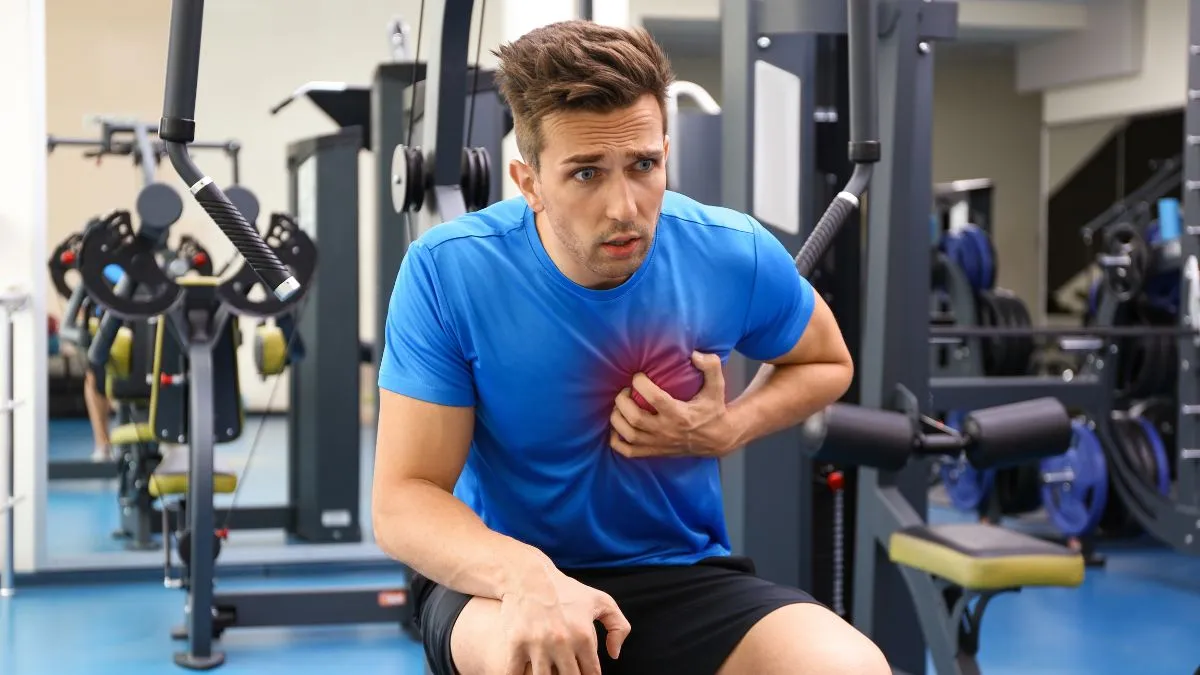- By Prerna Targhotra
- Sat, 24 Aug 2024 04:54 PM (IST)
- Source:JND
Early Signs Of Cardiac Diseases: Staying physically active through regular gym sessions offers many health advantages, notably enhancing cardiovascular health. Nonetheless, it’s crucial for those who exercise regularly to remain alert to potential signs of heart problems that might emerge during their workouts. Being aware of these early indicators can be vital for preventing severe health issues and ensuring a safe and beneficial exercise routine.
According to Dr Ajay Kaul, Chairman- Cardiac Sciences, Fortis Hospital, Noida, recognising hidden signs of cardiac ailments, especially during or after workouts, is crucial for gym-goers. Some symptoms might seem unrelated to heart issues, but being aware can prevent serious problems. Here are some signs to watch out for:
Early Signs Of Cardiac Diseases
Unusual Shortness of Breath: While it's normal to feel winded after intense exercise, difficulty catching your breath during light activities or rest could indicate a heart problem.
Chest Discomfort: Any form of chest pain, tightness, or pressure, especially if it radiates to the neck, jaw, shoulder, or arms, should be taken seriously. This could be a sign of angina or even a heart attack.
Excessive Fatigue: Feeling exhausted, even after adequate rest, might signal heart issues, particularly if this fatigue is persistent and worsens with exercise.
Irregular Heartbeat: Occasional irregular heartbeats might be harmless, but if you notice frequent palpitations, fluttering, or a racing heart, it could indicate arrhythmia or other cardiac concerns.
ALSO READ: Exercises For Healthy Heart: Best And Easy-To-Do Exercises To Keep Your Heart Fit And Fine
Dizziness or Lightheadedness: Feeling dizzy, lightheaded, or faint, especially during or after exercise, can be a sign of poor blood flow to the brain, which might be related to heart conditions.
Swelling in Legs, Ankles, or Feet: Swelling in the lower extremities can indicate fluid retention, which might be a sign of heart failure or poor circulation.
Persistent Cough or Wheezing: A cough that doesn’t go away, especially when accompanied by white or pink blood-tinged mucus, might be a sign of heart failure.
Nausea or Indigestion: These symptoms are often overlooked but can sometimes be related to heart problems, especially in women.
Sweating: Excessive sweating, especially cold sweats, during normal activities or rest, could be a red flag for a heart attack.
Pain in Other Areas: Pain in the back, neck, jaw, or stomach that occurs during exercise and isn’t linked to muscle strain might be cardiac-related.
Decreased Exercise Tolerance: If you suddenly find it hard to do exercises you once performed with ease, it could signal a heart issue.
Difficulty Sleeping or Sleep Apnea: Trouble sleeping, frequent waking, or shortness of breath at night might indicate heart failure or other cardiac problems.
Precautionary Measures
Listen to Your Body: Pay attention to how your body feels during and after exercise. Don’t ignore symptoms, no matter how mild they seem.
Regular Check-Ups: Regular cardiovascular screening, especially if you have a family history of heart disease, is crucial.
Warm-Up/Cool-Down: Ensure you’re properly warming up before and cooling down after workouts to avoid sudden stress on the heart.
Know Your Limits: Avoid pushing your body to extremes without proper conditioning and medical clearance.
If any of these symptoms persist or occur frequently, it's important to consult a healthcare professional to rule out any serious conditions.

